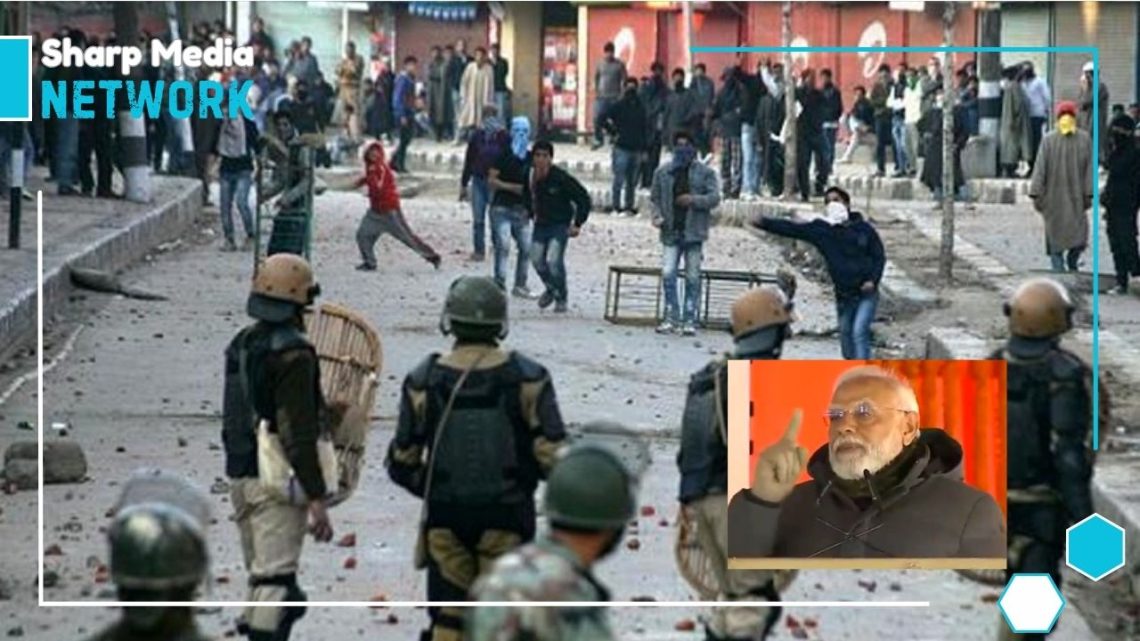
Modi’s Claims of Normalcy in IIOJK: A Political Rhetoric Disconnected from Reality
January 16, 2025Modi’s assertions of prosperity and progress in IIOJK post-Article 370 abrogation are contradicted by alarming economic indicators and social challenges.
Indian Prime Minister Narendra Modi’s frequent claims of normalcy and prosperity in Indian Illegally Occupied Jammu and Kashmir (IIOJK) after the abrogation of Articles 370 and 35A are increasingly coming under scrutiny. Analyzing the region’s economic performance and various developmental indicators reveals that Modi’s assertions are little more than politically motivated rhetoric, far removed from the actual ground realities.
Historically, IIOJK outperformed many Indian states on key economic and social metrics, showcasing resilience in areas like poverty reduction and life expectancy. For instance, in 2011-2012, India’s national poverty rate stood at 22%, while IIOJK’s poverty level was notably lower at just 10.3%. Similarly, between 2009 and 2016, life expectancy in IIOJK consistently exceeded the national average. Additionally, the literacy rate in the region, though slightly below India’s average, was still 67%, reflecting steady educational progress despite ongoing challenges.
However, since the 2019 revocation of Articles 370 and 35A, which downgraded IIOJK from a state to a union territory, the region has seen significant economic regression. Official data highlights alarming unemployment rates, particularly among the youth. As of the July-September 2024 quarter, the overall unemployment rate in IIOJK rose to 11.8%, up from 10.2% the previous year. Even more troubling is the 32% unemployment rate among those aged 15-29, far exceeding the national average of 15.9%.
Moreover, the unemployment rate in the 15-29 age group surged to 17.4% in 2023-24, again higher than the national average of 10.2%. The stark joblessness in IIOJK is underscored by the overwhelming response to government job exams, where over 5.5 lakh candidates applied for just 4,002 constable positions in December 2024.
The financial landscape in IIOJK is equally concerning. The region’s total liabilities soared to Rs 1.12 lakh crore in 2022-23, marking a steep increase from Rs 83,573 crore in 2019-20. IIOJK’s economic growth also witnessed a decline, from 13.28% between 2015 and 2019 to just 8.73% post-2019. Inflation in the region has consistently remained above the Indian average, with the J&K government’s economic survey for 2023-24 revealing that inflation only dipped below the national average in two years between 2018 and 2023.
These figures point to a declining economic trajectory, one that starkly contradicts the narrative of prosperity being propagated by the Indian government.
Beyond economic indicators, the Indian government’s policies in IIOJK have been accused of using financial measures to suppress dissent. The authorities have reportedly frozen the bank accounts of individuals suspected of being involved in anti-India activities, making it difficult for them to access their own funds or conduct transactions. There are also reports of pressure being exerted on regional banks to deny loans to individuals accused of anti-India sentiments.
In addition, the Indian administration has increasingly used employment as a tool to criminalize dissent. Kashmiris have been removed from government jobs or denied police verification, and controversial policies such as the implementation of the Reservation policy have raised further concerns. These actions, combined with the severe restriction on economic activity, have pushed the region’s residents into deeper socio-economic distress.
The lack of economic opportunities in IIOJK has led to rising stress and anxiety, particularly among the youth. High unemployment and the absence of visible prospects for growth have created a sense of disillusionment, further exacerbating the mental health crisis. The region is witnessing collective punishment, with Kashmiris being pushed to the wall by policies that restrict their financial independence and limit their future prospects.
The Modi government’s claims of improved normalcy in IIOJK stand in contrast to the reality on the ground. Despite assertions of peace and prosperity, the region continues to suffer from economic stagnation, high unemployment, and a growing sense of disenfranchisement. The Indian government’s narrative of success post-Article 370 abrogation fails to address the root causes of the ongoing crisis: the political aspirations of the Kashmiri people and the need for a resolution based on justice and international law.
As the economic and social conditions in IIOJK continue to deteriorate, it is clear that lasting peace and prosperity can only be achieved when the aspirations of the Kashmiri people are respected, and their voices are heard in the broader dialogue for a peaceful resolution of the Kashmir issue.

